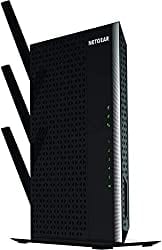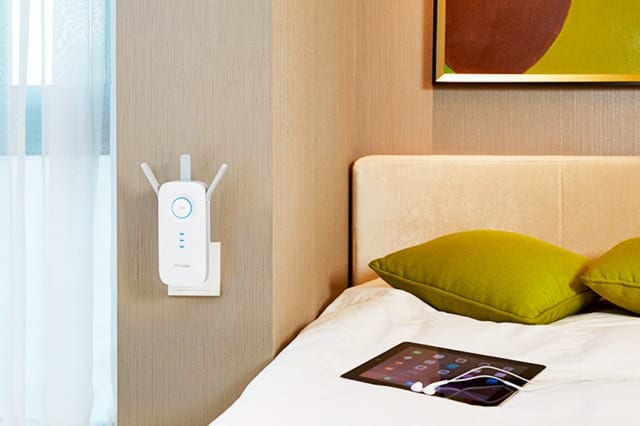When you’re unable to connect to Wi-Fi network at a specific area at home, it’s not always your ISP’s fault. Many times it’s simply a poorly set-up router. A lot of factors can cause slow Wi-Fi coverage or dead-spots, including thick walls, distance, and even household appliances. To minimize the number of dead spots and have excellent connectivity wherever you are in your home, Wi-Fi extenders may come in handy.
What are Wi-Fi Extenders?
As its name suggests, Wi-Fi extenders extend the reach of your wireless signal beyond its usual coverage. Technically, it’s a device that connects to an existing wireless network and then rebroadcasts the signal from that network further. So if you’re having trouble connecting poolside, set up a Wi-Fi extender and enjoy your iPad in the sun.
Ideally, the Wi-Fi extender has to be placed close enough to your router to communicate with it, but far enough away to extend the router’s range. For starters, try setting it up in a central location in your house. Keep in mind, though, that if the device is too near your router, you may not be able to increase your Wi-Fi’s range by too much. On the other hand, place it too far and the strength and speed of your connection may be greatly reduced.
It’s tough finding that sweet spot where your Wi-Fi extender can be effective in both its coverage and quality. Just try not to place it in areas where there’s a really bad signal. If you do that, it’ll only be extending an equally weak internet connection.
When Do You Need a Wi-Fi extender?
Wi-Fi extenders are a great solution when you wish to stretch your Wi-Fi connectivity to only a few more rooms or up/down a floor. With such a limited space to cover, your device will be able to fetch excellent connectivity in throughout your home.
Another situation where Wi-Fi extenders aren’t a practical choice is when you’ve got an aging or bad router. You may have a super-fast, top-of-the-line extender, but it won’t have any noticeable effect on your wireless performance or speed if your router is old. If it’s still using an 802.11G connection, using extenders may be a bad idea. Consider upgrading your current router setup first.
Aside from these tips, a Wi-Fi range extender may not be the best way to go when you’ve already got other extenders set up within your home/office. In most cases, having multiple Wi-Fi extenders in an area will cause them to interfere with each other’s signals.
What Are the Best Wi-Fi Extenders on the Market?
Wi-Fi extenders hold the distinction of being the fastest and most economical way to expand your Wi-Fi coverage at home or in the office. However, some models are better in this regard compared to the rest you see on the market today.
So we’ve done our homework to give you a better idea on the range extenders that give the most bang for your buck.
Broadest Range
You definitely want an extender that covers the most ground, literally. Indeed, the device you invest in should provide consistent internet connection throughout the home or office’s space. The front runner in this category is the NETGEAR Nighthawk AC1900 Desktop WiFi Range Extender.


With an innovative hardware and three antennas, the Nighthawk delivers consistent high-speed connection across long distances. Even its lowest speed is visibly faster than competitors at the same distance. In fact, we’ve seen the Nighthawk extend a Wi-Fi signal throughout an office building without any signal dropouts.
Best Frequency Bands Compatibility
Nowadays, Wi-Fi signals come in two frequency bands: 2.4GHz and the 5GHz. While the more common 2.4GHz will suffice in passing through solid objects, the 5GHz band has become quite popular since they experience less interference from other signals. With that said, a dual-band range extender that can juggle between both bands will provide a very consistent connection. We recommend using the TP-Link N300 Wi-Fi Range Extender.
The price on the N300 is impressive in its own right. At $20, it alternates between 2.4GHz and 5GHz seamlessly, and extends a consistently strong connection while in range. The downside is that its connectivity falters at long range so it has to be properly placed.
Best Ethernet Speed Booster
Wi-Fi extenders should act as hubs for high-speed wired connections, as well as wireless. Extending a wired connection is quite convenient when you want to stream across various devices. Wired connections are faster for game consoles, streaming devices, and smart TVs. Ethernet connections are also far stabler than Wi-Fi. Most Ethernet ports you find in range extenders nowadays are the 100Mbps speeds. Amped Wireless High Power Wireless-N 600mW Smart Repeater and Range Extender ($73) runs at 1000Mbps.
Popularly known for its strong mechanics and Gigabit ports, this Wi-Fi extender from Amped Wireless suits the current and future high-speed internet well. Capable of achieving speeds ten times better than normal Ethernet, we’ve seen it handle several HD videos simultaneously. Without a doubt, this is a great investment for homes that have high-speed internet.
Having dead spots and weak signals in the corners of your home or office is a tell-tale sign that your Wi-Fi router isn’t powerful enough. In this case, a Wi-Fi extender will definitely come in handy. It’s the fastest and cheapest way to maximize your Wi-Fi connection’s effective range.


